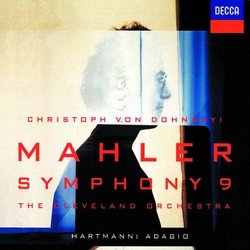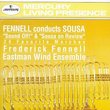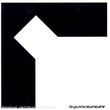| All Artists: Mahler, Dohnanyi, Cvo Title: Symphony 9 Members Wishing: 0 Total Copies: 0 Label: Decca Original Release Date: 1/1/2000 Re-Release Date: 4/13/1999 Genre: Classical Styles: Historical Periods, Modern, 20th, & 21st Century, Symphonies Number of Discs: 2 SwapaCD Credits: 2 UPC: 028945890227 |
Search - Mahler, Dohnanyi, Cvo :: Symphony 9
 | Mahler, Dohnanyi, Cvo Symphony 9 Genre: Classical
|
Larger Image |
CD DetailsSimilarly Requested CDs
|
CD ReviewsImpressive Achievement 04/16/1999 (5 out of 5 stars) "Christoph von Dohnányi's core repertoire is in the Wagnerian tradition and its Expressionist offshoots into the 20th century - Wagner, Bruckner, Mahler, Strauss, and Bartok. Furthermore, he acquits himself very well, even superbly, though he doesn't seem quite at home in other strands: Mozart, Mendelssohn, Schumann (his account of the Schumann symphonies is exceptional) Tchaikovsky, and Ravel. Dohnányi sweats to build a convincing, personal road. You may not agree with what he comes up with, but you can't dismiss it either. Dohnányi forces you to engage his ideas. His approach stands at the opposite end of the desire for the "definitive." With a reformer's zeal, he wants us to hear. His main fault is that he doesn't want to relax. I've never heard a really unbuttoned performance (except his Dvorak 8th). Most of his accounts, though, reveal a side of the composer missed by everyone else. Dohnányi approaches music differently and his orchestra reflects this. The rhythmic and textural clarity remains as do the rich detail and lucid structure, but Dohnányi wears his passions and enthusiasms on his sleeve. Until this new account of the Mahler Ninth by Dohnányi and his Clevelanders, I have never heard an account that communicates so vividly the undergirding psychology of this symphony - the titanic struggle against the forces of death, negation and hostility. The outer movements are spacious and build with tension. The climaxes erupt like a volcano. The quiet passages are played with utmost tenderness and gentleness. While it lacks the emotionalism of Walter and the brooding angst of Bernstein, it does not lack for emotive power. Dohnányi treats the Ninth as truly symphonic and not episodic as many have done. Dohnányi musical mind is architectural. This performance of the Mahler Ninth reveals an architect's foresight, always making the musical structure palpable, even sensuous - all sculpted by the musical line. With conductors "in the moment" like Walter or Bernstein, you sometimes ran out of room at the extremes of tempo and dynamics. The slow pulse broke down and the music temporarily died. Dohnányi always knows where he is and where he is going. This recording is an impressive achievement and it makes one wonder why Decca did not renew their contract with Dohnányi and his Clevelanders." Excellent playing in every way. Stephen Swanson | Seattle, WA/Denton TX | 09/28/2001 (4 out of 5 stars) "I own numerous versions of what could be the greatest symphony ever written, and I believe this glorious recording with Dohnanyi and his Clevelanders is without question the most spectacularly well played. Mr. Dohnanyi has a fantastic ear for balances, which is extremely obvious throughout the symphony, and the orchestra responds in kind. The performance does not, however, sport the miraculously profound interpretation of Jascha Horenstein in his 1950's version with the Vienna Symphony. This is the only real drawback to the Cleveland recording, which is superior in every way, but which does not plumb the absolute depths of expression as Horenstein does. Had I not picked up the Horenstein recording on a whim I would have been blissfully ignorant of that fact upon listening to the Dohnanyi. This is not to say Dohnanyi is not a noble interpreter; he is one of the greatest and most underrated of recent times (listen to his mid-80's recording of Beethoven's 5th for an example how exciting and emotional a recording can be that is still extremely respectful of the score). He gave a Mahler 1 performance here in Dallas last May that was one of the greatest concerts I have ever been to. Nonetheless my first recomendation for Mahler's 9th for the interpretation is the Horenstein. But the Cleveland recording is by far the most well-played, as well having an excellent interpretation (listen to the glorious string playing in the last minutes of the piece)." Definitive Stephen Swanson | 05/07/1999 (5 out of 5 stars) "I agree with most of what Mark from Charlotte has said. Although I think Dohnanyi and the Cleveland Orchestra do produce a definitive performance in this recording. It will become the standard of comparison. The tempos are just right. In particular, the playing of the horns give the symphony a forward looking 20th century feel to it. Dohnanyi interpretes it as a rueful reflection of life in light of pending death. Marvelous! The Hartmann piece is a great coupling that maintains the spirit of Mahler."
|

 Track Listings (3) - Disc #1
Track Listings (3) - Disc #1





